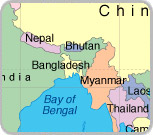Knowledge Centre
|
>> The Role of “Technology-Based Community Learning Centers”
The issues associated with providing access for literacy workers and learners to technology appliances such as computers, audio and video equipment, as well as on-line connectivity, needed to be resolved in order for the project to proceed. The traditional models of distance education, where the assumption is that learning will occur primarily in the home, are clearly not sufficient in the context of literacy programs in developing countries. Therefore the delivery model selected was that of a “technology-based community learning centre” that would enable learners to have access to the technological appliances as well as to a place to gather and interact with others. These centers also provide literacy program staff and tutors with the tools to develop, acquire and adapt teaching materials. As a result, these centers are at the core of the implementation of the project. An important aspect of the project evaluation will be an assessment of how effectively these outcomes are enabled through this community learning centre model.
The development of these centers as part of the overall project adds an important dimension in that they may be used for other purposes as well, thereby adding to the capacity to make them more sustainable. The centers are being used for the skill enhancements of rural youths in computer and aided knowledge, breast cancer screening services and for rural database program. The equipments for the centers are provided by the DFID through Computer Aid International UK. Software donation made by Microsoft Corporation.
Project Locations
The three-year pilot Project is ended in September 2007 in 20 villages of southwest Bangladesh. The project is now expanding 25 more districts around the country.

